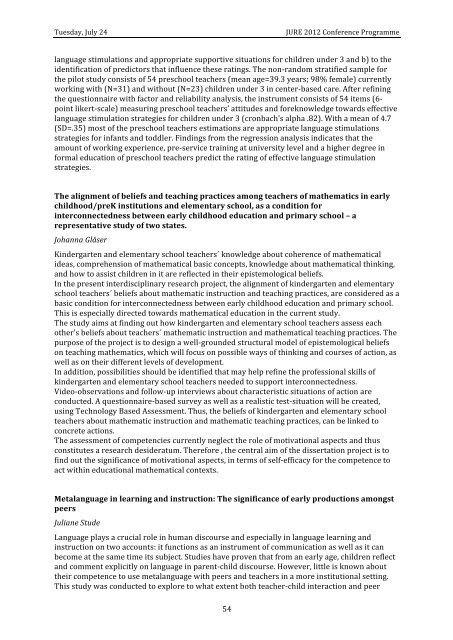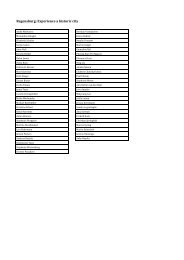JURE 2012 Programme book - EARLI Jure 2012
JURE 2012 Programme book - EARLI Jure 2012
JURE 2012 Programme book - EARLI Jure 2012
Create successful ePaper yourself
Turn your PDF publications into a flip-book with our unique Google optimized e-Paper software.
Tuesday, July 24 <strong>JURE</strong> <strong>2012</strong> Conference <strong>Programme</strong><br />
language stimulations and appropriate supportive situations for children under 3 and b) to the<br />
identification of predictors that influence these ratings. The non-‐random stratified sample for<br />
the pilot study consists of 54 preschool teachers (mean age=39.3 years; 98% female) currently<br />
working with (N=31) and without (N=23) children under 3 in center-‐based care. After refining<br />
the questionnaire with factor and reliability analysis, the instrument consists of 54 items (6-‐<br />
point likert-‐scale) measuring preschool teachers’ attitudes and foreknowledge towards effective<br />
language stimulation strategies for children under 3 (cronbach’s alpha .82). With a mean of 4.7<br />
(SD=.35) most of the preschool teachers estimations are appropriate language stimulations<br />
strategies for infants and toddler. Findings from the regression analysis indicates that the<br />
amount of working experience, pre-‐service training at university level and a higher degree in<br />
formal education of preschool teachers predict the rating of effective language stimulation<br />
strategies.<br />
The alignment of beliefs and teaching practices among teachers of mathematics in early<br />
childhood/preK institutions and elementary school, as a condition for<br />
interconnectedness between early childhood education and primary school – a<br />
representative study of two states.<br />
Johanna Gläser<br />
Kindergarten and elementary school teachers´ knowledge about coherence of mathematical<br />
ideas, comprehension of mathematical basic concepts, knowledge about mathematical thinking,<br />
and how to assist children in it are reflected in their epistemological beliefs.<br />
In the present interdisciplinary research project, the alignment of kindergarten and elementary<br />
school teachers´ beliefs about mathematic instruction and teaching practices, are considered as a<br />
basic condition for interconnectedness between early childhood education and primary school.<br />
This is especially directed towards mathematical education in the current study.<br />
The study aims at finding out how kindergarten and elementary school teachers assess each<br />
other’s beliefs about teachers´ mathematic instruction and mathematical teaching practices. The<br />
purpose of the project is to design a well-‐grounded structural model of epistemological beliefs<br />
on teaching mathematics, which will focus on possible ways of thinking and courses of action, as<br />
well as on their different levels of development.<br />
In addition, possibilities should be identified that may help refine the professional skills of<br />
kindergarten and elementary school teachers needed to support interconnectedness.<br />
Video-‐observations and follow-‐up interviews about characteristic situations of action are<br />
conducted. A questionnaire-‐based survey as well as a realistic test-‐situation will be created,<br />
using Technology Based Assessment. Thus, the beliefs of kindergarten and elementary school<br />
teachers about mathematic instruction and mathematic teaching practices, can be linked to<br />
concrete actions.<br />
The assessment of competencies currently neglect the role of motivational aspects and thus<br />
constitutes a research desideratum. Therefore , the central aim of the dissertation project is to<br />
find out the significance of motivational aspects, in terms of self-‐efficacy for the competence to<br />
act within educational mathematical contexts.<br />
Metalanguage in learning and instruction: The significance of early productions amongst<br />
peers<br />
Juliane Stude<br />
Language plays a crucial role in human discourse and especially in language learning and<br />
instruction on two accounts: it functions as an instrument of communication as well as it can<br />
become at the same time its subject. Studies have proven that from an early age, children reflect<br />
and comment explicitly on language in parent-‐child discourse. However, little is known about<br />
their competence to use metalanguage with peers and teachers in a more institutional setting.<br />
This study was conducted to explore to what extent both teacher-‐child interaction and peer<br />
54



